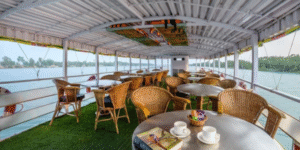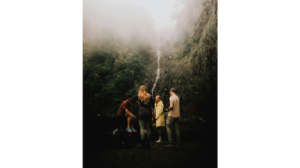1. Why should you experience local cultures when traveling?
Answer: This is a method of understanding the world around you, enhancing your travel experience, and promoting cultural exchange and appreciation. In addition, this will support the local community as well as maintain traditional practices.
2. How can I learn about the local culture before traveling?
Answer: Find out the history, customs, and traditions of the destination online or by reading books, watching documentaries, or through social media from local sources. Learn some basic phrases in the local language as a sign of respect.
3. How would you respectfully interact with local communities?
Answer: Be polite, ask questions with curiosity, and respect local customs and traditions. Avoid stereotypes and be open to learning from locals. When visiting sacred sites, follow appropriate dress codes and behavior.
4. How can I avoid being a “tourist” and be more like a local?
Answer: Look for off-the-beaten-path activities, eat at local restaurants, rather than those designed for tourists. Shop at markets, and use public transport. Meaningful conversations with locals could show you the color and flavor of daily life.
5. What should I know about local customs and etiquette?
Answer: Customs vary by region, so research practices like greetings, dining etiquette, and tipping norms before arriving. For example, some cultures value formal greetings or particular gestures like bowing or offering gifts with both hands.
6. How can I support local businesses while traveling?
Answer: Shop at local markets, eat at family-owned restaurants, and hire local guides. Avoid large international chains when possible, as supporting local businesses ensures that more money stays within the community.
7. Is it important to learn the local language?
Answer: Learn basic phrases in the local language, such as “hello,” “thank you,” and “please.” It shows respect and helps build rapport with locals. Even if you don’t speak fluently, locals often appreciate your effort to communicate in their language.
8. How do you avoid cultural appropriation while traveling?
Answer: Be careful while interacting with the local cultural aspects, for example, dresses, food, or rituals. Do not adapt sacred or cultural practices for fashionable or novelty purposes. Respect what you are going through as cultural.
9. How do I respect local traditions when visiting sacred sites?
Answer: Follow guidelines, dress modestly, remove shoes where required, and keep noise to a minimum. Understand the significance of the site, and avoid disruptive or disrespectful behavior, such as taking inappropriate photos or touching sacred objects.
10. What is the best way to learn about a country’s food culture?
Answer: Visit local food markets, take a cooking class, and sample regional specialties at small, family-owned restaurants. Ask locals for recommendations and learn about the ingredients, preparation methods, and dining etiquette unique to the area.
11. How can I participate in local festivals and celebrations?
Answer: Research the festivals and events that coincide with your trip, and engage respectfully by attending public events, learning about the festival’s history and participating where appropriate. Ask locals if there are any traditions or practices you should be aware of.
12. How do I understand local art and crafts?
Answer: Visit local museums, galleries, and artisan markets. Take time to ask about the artists’ techniques, the cultural significance of their work, and how they reflect the history and identity of the community.
13. What are some ways to connect with locals during my travels?
Answer: Attend community events, participate in local workshops, volunteer, or stay in homestays or locally owned accommodations. Casual conversation with shop owners or neighbors can also be a good way to connect.
14. How do I dress to fit in with the locals?
Answer: Dress appropriately according to the local customs, especially when visiting religious sites or rural areas. Research the fashion norms of the region and wear modest clothing if necessary. Do not wear flashy or attention-seeking clothes in conservative areas.
15. What do I need to know about tipping customs in other cultures?
Answer: Tipping is country-specific. In some places, tipping is a norm while in others, it may even be considered impolite. Always research tipping practices for restaurants, taxis, guides, and other services when visiting a foreign country.
16. How do I experience a country’s music and dance culture?
Attend local music festivals, visit cultural venues such as opera houses or theatres, or take a dance class to learn traditional forms. Ask locals about their favorite music or performances and participate in community events where music and dance are featured.
17. What role does religion play in local cultures?
Answer: Religion affects customs, festivals, architecture, and daily life in many places. Be respectful of religious practices by learning what they mean, dressing appropriately when visiting places of worship, and learning about local beliefs.
18. How can I avoid unintentionally offending people?
Answer: Avoid cultural taboos, which include inappropriate gestures, language, or behavior. Be mindful of public conduct, and always ask if you are unsure about something. Be sensitive to local values and traditions as well.
19. How do I respect the environment while experiencing local cultures?
Answer: Reduce waste, recycle, and don’t damage any natural or cultural heritage site. Support environmentally responsible and sustainable enterprises.
20. How can I contribute to preserving the culture in which I travel?
Answer: Support local artists, customs, and sustainable tourism initiatives. Refrain from activities such as visiting wild animal parks, which are considered exploitative of animals. Take part in community-based activities such as workshops for cultural preservation.
21. How can I experience local culture in rural areas?
Answer: Stay with local families, visit traditional farming villages, and participate in agricultural activities. Engage in storytelling sessions or traditional crafts and appreciate rural ways of life that may differ from urban norms.
22. What should I do if I’m invited to a local home?
Answer: Accept the invitation with gratitude and respect. Follow the hosts’ traditions and customs, such as bringing a small gift, removing your shoes, or eating what’s offered. If you’re unsure about something, ask politely.
23. How can I get involved in local volunteer opportunities?
Answer: Find out about local charities or community organizations that provide volunteer work. Ensure the activity you undertake will be serving the community appropriately and responsibly so that it doesn’t exploit them but instead serve them.
24. How would I get an insight into a country’s past when visiting it?
Answer: Go to museums, cultural houses, and historic monuments. Ask for guided tours by locals; this way, you’ll gain deeper insight and knowledge of where you’re visiting.
25. How can one respect local’s privacy and their personal space?
Answer: In a particular region, respect will be there related to cultural privacy. People talk in closer places in some societies, whereas at some other place the distance matters before the conversation is delivered. Watch carefully the body gestures and follow appropriately.
26. What role markets play in your culture?
Answer: Local markets are usually a hub of activity in the local economy, creating a space for social interaction and cultural exchange. Visiting them gives a window into the everyday lives of the locals, their food, crafts, and traditions.
27. What is the role of storytelling in local cultures?
Answer: Story telling helps preserve stories, traditions and values. Contact local storytellers or attend stories, myths and legends performances by local storytellers to understand your cultural heritage 28. Experiencing of local sports of games
Answer: Attend a local sporting match or try regional games that make up the culture. Whether soccer, cricket, or other localized activities, attendance or participation will be an excellent way to comprehend the values in a culture along with teamwork.
29. How do I participate in a local workshop or craft session?
Answer: Seek out local art or craft workshops where you can learn the traditional techniques, such as pottery, weaving, or cooking. Ask locals for recommendations or research cultural centers offering such experiences.
30. What do I need to know about photography and taking pictures in local areas?
Always seek permission when taking pictures, especially in such sensitive locations like religious sites or rural areas. Be aware of cultural sensitivities regarding photography, and avoid taking pictures of people without consent.
31. How can I enjoy local food and beverages respectfully?
Answer: Try local dishes and drinks, but be mindful of portion sizes and local dining customs. If you’re unsure about ingredients or how to eat a dish, ask the locals for guidance. Share meals when appropriate and savor the culinary experience.
32. What are the benefits of slow travel in experiencing local cultures?
Answer: Slow travel lets you be more immersed in a destination for a longer period of time, and you get the opportunity to make meaningful relationships with locals and get to know the culture in depth rather than just skimming the surface.
33. What can I learn from local traditions and crafts?
Answer: Local traditions and crafts will give you insight into the community’s cultural values, historical influences, and creativity. They will make you connected to the place’s past, beliefs, and ways of life. You can feel the appreciation of the people’s heritage.
34. How do I get to know the local music scene?
Attend live music performances, local festivals, or visit music venues that show case traditional music. Ask locals about their favorite musicians or songs and participate in music-related cultural events.
35. What is the role of rituals and ceremonies in local cultures?
Answer: Rituals and ceremonies are ritual components common to many cultures, carrying with them notions of spirituality, social bonds, and the identity that comes with culture. Participation in such activities, respectively, can deepen your understanding of a community’s value and traditions.
36. How can I connect with the locals?
Answer: Be authentic, accessible, and respectful. Make the time to listen and learn the local views. The more time spent in a particular area, the better, and revisiting places you’ve had a positive experience is ideal for further connecting.
37. What role do indigenous cultures play in travel experiences?
Answer: Indigenous cultures provide a different view of history, land, and spirituality. Responsible support for indigenous communities helps to preserve their traditions while promoting cultural diversity and understanding.
38. How can I be a responsible cultural tourist?
Answer: Select tour operators that are ethically responsible, avoid activities that exploit local cultures or wildlife, and respect local traditions. Focus on minimizing your environmental impact and supporting businesses that prioritize sustainable practices.
39. What common cultural misconceptions should I be sensitive about?
Avoid generalizing culture or stereotyping because of knowledge gaps. To truly understand their people, culture, and its ways, make a conscious effort to learn and study the actual details of this specific culture before entering another’s land.
40. How do I have a good experience when traveling so I can reap cultural benefits while away?
Be open-minded, ask questions, engage in local events, and show respect. Savor the differentness of this culture while immersed in its peoples and customs for a richer experience and greater sense of fulfillment.










Hey everyone! Decided to try my luck at 99winwin and I’m glad I did. Their customer support is really responsive and helpful, which is always a plus. Good vibes so far!